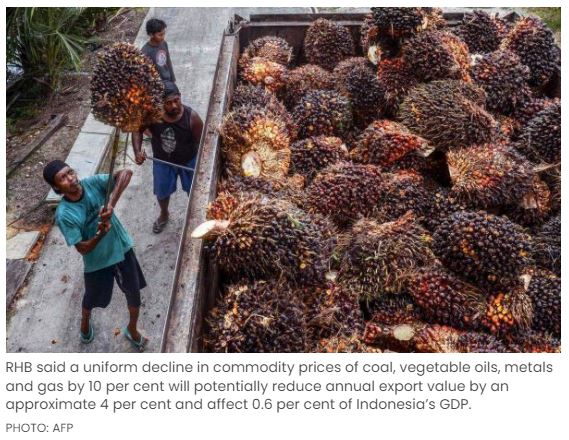Indonesia’s growth to slow in H2 as commodity prices fall: RHB
GIVEN Indonesia’s position as a major commodities exporter, growth momentum for the country is likely to slow in the second half of the year as key commodity export prices undergo a correction.
Holding all things constant, senior economist at RHB Bank Barnabas Gan hypothesised in a report on Friday (Aug 12) that a uniform decline in commodity prices of coal, vegetable oils, metals and gas by 10 per cent will reduce annual export value by an approximate 4 per cent and affect 0.6 per cent of Indonesia’s gross domestic product (GDP).
It will also tip current account balance to a deficit of 0.3 per cent of GDP in 2022 if the above happens, against RHB’s current forecast of 0.2 per cent surplus, he said.
This is in contrast with the country’s current narrative of export growth — which accelerated to 1.55 per cent in the second quarter this year, underpinned by consumer demand amid soaring commodity prices. Compared with the 1.43 per cent in Q1, this is the fastest rate of growth since the first quarter of last year, Gan noted.
At present, Indonesia’s exports benefit from higher energy prices supported by the ongoing supply chain disruptions and global intensified geopolitical tensions — which also uplifted natural gas and coal prices.
However, other commodity prices like palm oil and metals have declined significantly since the year started. Gan thinks that with growing inflation concerns and risks of a global economic slowdown, the commodity price correction may spill over to the energy space in 2023 and drag overall growth and exports in Indonesia.
Further, higher inflation in H2 — estimated at 4.15 per cent amid policy rate hikes to 4 per cent by year-end — could dissuade consumer expenditure and drag on the heels of Indonesia’s growth momentum, said Gan.
Hence for the year 2023, the senior economist pencilled GDP growth for the country to stand at 4.1 per cent, against Bloomberg’s median forecast of 5.2 per cent.
Taking into account expectations for lower commodity prices, he forecasted a current account deficit of 0.5 per cent of GDP in 2023.
RHB further maintained its call for Bank Indonesia to lift its policy rate to 4 per cent from the current 3.5 per cent, in the second half of the year.
“Higher rates may be needed to stem fund outflows and further weakening of the Indonesian Rupiah (IDR),” said Gan.
“We believe that the risk for IDR to stay weak amid intensified fund outflows is a persuasive factor for policymakers to lift the policy rate in September and December. “
Source: https://www.businesstimes.com.sg/asean-business/indonesias-growth-to-slow-in-h2-as-commodity-prices-fall-rhb


 Thailand
Thailand




